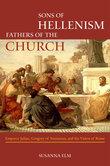Berkeley Books: Sons of Hellenism, Fathers of the Church: Emperor Julian, Gregory of Nazianzus, and the Vision of Rome

Behind Christinaity's longevity and adaptability is the Roman ideology of universalism, argues Professor of History and Classics Susanna Elm in this month’s Berkeley Books selection: Sons of Hellenism, Fathers of the Church: Emperor Julian, Gregory of Nazianzus and the Vision of Rome. According to Elm, who has taught at Berkeley since 1988 and has served as Director of the Program for Religious Studies as well as Chair of the Graduate Program in Ancient Mediterranean History and Archaeology, the two universalisms of the fourth century — Christianity and the Roman Empire — competed to recalibrate the Roman concept of oikoumenē (the realm, or universe) according to the nuances in the conceit and the phrasing of the divine.
Elm provides an engaging framework for showing how Christian elites integrated their religion into the matrices of the Late Roman Empire by following two figures at odds with each other: the short-reigning Emperor Julian and the Bishop of Constantinople Gregory of Nazianzus. They were “intellectual twins” whose contrasting thoughts on the divine and political leadership were informed by the same methods and sources (Plato, Aristotle, the newly canonical Scripture, and so on). In closely reading the writings, letters and orations of these two influential men, Elm emphasizes the centrality of paideia (shared education) in matters of religion, politics and governance. As she demonstrates, they debated not only over different positions but also over proper logical deduction and language theory. Their debates, in other words, underscore the role of textual interpretation and rhetorical consensus in shaping cultural and public life.
Elm begins by describing the Eastern Empire, the exegetical conflicts over the essence of the Son to the Father and, in light of these, Julian’s rise from Caesar to Augustus — his self-fashioning as a philosopher-king, his writings and the “public relations campaign” he waged over what he considered to be the wrong innovations of Christianity. In Part Two, she thoroughly examines Gregory’s Oration 2, his allegiances as a son, a provincial leader and a political philosopher, and the challenge he faced in producing a counter-vision as systemic as Julian’s. The final part of the book begins with Julian’s death, looking at how Gregory deconstructed the emperor's legacy in Oration 4, 5 and 6. She explains that while Julian based his policy of religious openness on logoi (the sacredly-held ideological apparatus of Greek-Roman culture), Gregory’s confutation framed logi as the means to Logos. For Elm, Gregory is no mere influential Early Christian theologian; as representative of New Rome’s Christians who came to be known as “Fathers of the Church,” Gregory exemplifies how these leaders' philosophies stem less from biblical prescriptions than from the social realities of Greek and Roman elite men.
Elm stresses that small differences in small things like words produce radical consequences in shaping the world. Drawing further conclusions on the micro-social history of ideas, she notes, “words can be so powerful and the consequences of small differences so radical because of profound similarities.”
Visit the Biblio-file to view books that informed Professor Elm's thinking while working on Son's of Hellenism, Fathers of the Church.
Sookyoung Lee is a Graduate Student Researcher at the Townsend Center for the Humanities.